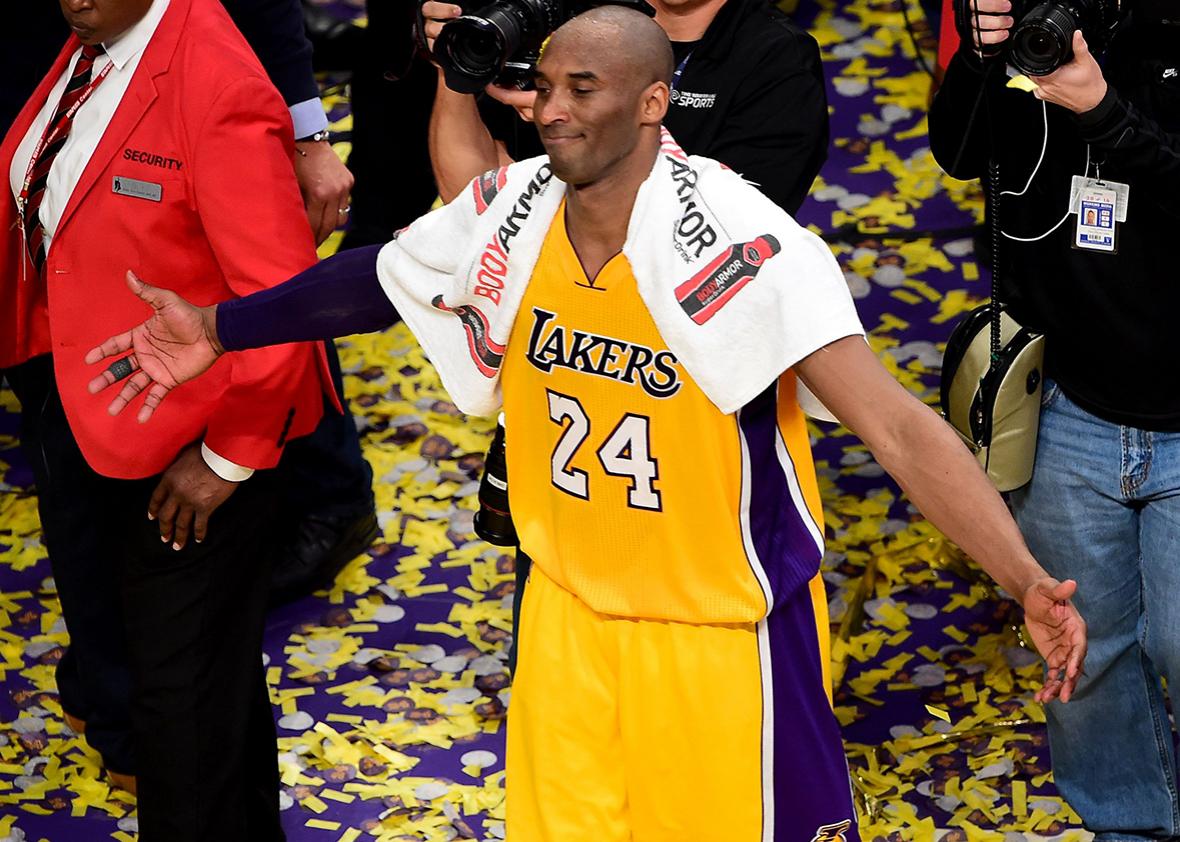Kobe Bryant is not the best basketball player of all time. He is not the best basketball player of his generation. He is not the greatest Laker ever. Or one of the three greatest Lakers ever. Or maybe even one of the five greatest Lakers ever. (Kareem, Magic, Shaq, Jerry West, and Elgin Baylor were all pretty great. There are more great Lakers than Great Lakes, which is why the franchise has won 16 titles.)
On the morning after his final game, Bryant is deserving of one superlative: He is the greatest performer of greatness in basketball history. Wednesday night’s 50-shot, 60-point showcase against the Utah Jazz was a flawless imitation of virtuosity. Modern NBA franchises prize efficiency. Kobe delivers basketball tonnage. He is an album’s worth of great songs in a Lucite-encased, seven-disc, digitally remastered box set.
Kobe shot more times against Utah than any player has hoisted the ball in a single game since the 1983–1984 season, the year the field goal attempt became an official statistic. He missed 28 times on Wednesday, two off his all-time record, but also ran off 17 points in a row in leading Los Angeles to a comeback victory. That would’ve been more impressive if anyone else in purple and gold had been granted the opportunity to score. But it was still remarkable that the 37-year-old Bryant made those shots down the stretch, and hilarious that he took them. His career finale was a 48-minute-long exercise in nonsublimation of the ego.
Bryant calls himself a thief. He stole Michael Jordan’s fadeaway, Hakeem Olajuwon’s footwork, and Michael Jackson’s work ethic. It’s probably more accurate to call him a sculptor. For two decades, he’s molded himself in the image of a legendary athlete. Kobe Bryant, basketball hero, is his best and only creation.
In 2006, when Kobe was at the exact midpoint of his career, Sam Anderson wrote in Slate that Bryant had been uniquely warped by Jordan:
He’s plagiarized MJ’s game so expertly that, in many ways, he’s ahead of the master’s curve—Kobe is stronger than the 27-year-old Jordan and has a deadlier outside shot. But for all his miraculous skills, Kobe is painfully bad at mythmaking. Since he’s a Jordan-like talent, Kobe clearly thinks that he’s entitled to the Jordan mythology, but he doesn’t have any of Jordan’s charisma or imagination. As melodramatic and managed as Jordan’s career was, there was some authentic core—it was original and seemed to mean something. Kobe exists entirely within quotation marks.
While Kobe’s skills diminished with age, his ability to project authenticity—or maybe our willingness to project authenticity onto him—improved with each passing season. He was a maniacal worker. He didn’t hold back in interviews. In a new-school league, on a team that fell apart this season in new-school ways, he embodied old-school values.
As badly as he wanted to be the Michael Jordan of his era, Kobe turned out merely to be the Pete Rose of basketball, as Deadspin’s Albert Burneko noted on Wednesday. There are the numbers, suggestive of both inefficiency and longevity. Rose is first in baseball history in career hits and 40th in career wins above replacement. Bryant is a better player, somewhere between 16th and 34th depending on which advanced metric you look at, but he is third all-time in field goal attempts.
It’s more than the stats, though. Like Rose, Kobe is a relentless self-mythologizer. And like Rose, his greatest skill is his ability to discern what fans and sportswriters want to see. Rose, aka Charlie Hustle, got his uniform dirty because that meant he was playing hard; he collected more hits than anyone in major-league history because getting hits is what baseball players are supposed to do; he played for 24 seasons because he loved playing the game, and also baseball statisticians don’t allow you to collect more hits after you retire.
Careers rarely end so neatly, with the last part standing so perfectly for the whole. Jordan’s two-part goodbye did. In 1998, he stole the ball from Utah’s Karl Malone, drove on Bryon Russell, pushed off, and swished a jumper in Russell’s face. He posed with his wrist suspended in midair, the perfect image of success and indomitability, the six-time title winner taunting his latest victim. And then, in 2001, he came back for two sad seasons with the Wizards, leaving for good after a 15-point performance at the end of a desultory 37–45 season. This was Michael Jordan: the sport’s greatest champion, too competitive and needy to let his storybook finale stand.
Kobe’s last game was quintessentially Kobe. To the very end, his career played out within the myth he had fashioned for himself. He had the spotlight Wednesday night, and he told the guy backstage to crank it to a million lumens. He shot and shot and shot, and the ball went through enough times for the Lakers to put the game in the W column, because “winning is all that matters” is a thing that people say even after a meaningless game at the end of a 17-win season.
Of course, the big winner against Utah was Kobe Bryant’s personal brand. After it was over, he got on the microphone at center court, thanked the Lakers crowd, and said “Mamba out” as he laid the mic on the floor. Within the hour, he was selling “Mamba Out” merchandise on his personal website.
